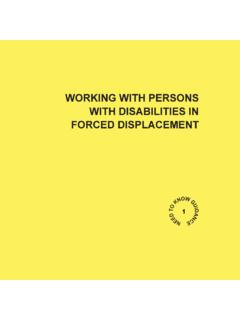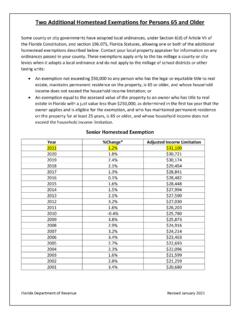Transcription of Medicaid Estate Recovery Helping Older Persons …
1 Pro Seniors, Inc. Page 1 of 5 Medicaid Estate Recovery Liens _____ 1. What Is The Medicaid Estate Recovery Program? Medicaid Estate Recovery is a federally mandated program that began in Ohio January 1, 1995. When a Medicaid recipient dies, the MER Program attempts to recover from their Estate what Medicaid paid for all services provided. MER is only from the estates of Medicaid recipients aged 55 years or Older and those of any age that were permanently institutionalized. MER Medicaid services are defined as any medical assistance correctly paid by Medicaid . See our Medicaid Estate Recovery pamphlet for non-lien information on the MER Program.
2 2 . What Is An MER Estate ? The MER Estate includes survivorship property and all other real and personal property in which the Medicaid recipient had any legal interest at the moment before death. The MER program is permitted Recovery to the extent of the deceased Medicaid recipient s interest in such property. Note that after the death of the Medicaid recipient, any property Medicaid determined exempt for purposes of determining Medicaid eligibility is no longer exempt or excluded. 3. Who Administers The Program? In Ohio, the Ohio Department of Job and Family Services (ODJFS) and the Ohio Attorney General s Office (AGO) administer the MER Program.
3 At the time of application or re-application for Medicaid , the County Department of Job and Family Services (CDJFS), through JFS Form 07400, informs Medicaid recipients of the MER Program. Helping Older Persons With Legal & Long-Term Care Problems Pro Seniors, Inc. Page 2 of 5 4. What Are Liens? A lien is any official claim or charge against real property for payment of a debt or an amount owed for services rendered. Generally, a lien is paid off from the proceeds of the sale when the real Estate is sold. A mortgage is a form of lien, and any lien against real property must be recorded with the county recorder to be enforceable.
4 There are numerous types of liens including: a mechanic's lien against the real property upon which a workman, contractor or supplier has provided work or materials and a tax lien to enforce the government's claim of unpaid taxes. 5. What Is An MER Lien? To help it recover the costs of Medicaid services the Medicaid program correctly paid or will pay on behalf of the Medicaid recipient, ODJFS may impose a lien. This MER lien may only be placed against the home and other real property of a Medicaid recipient who is permanently institutionalized, or the real property of a spouse of a permanently institutionalized Medicaid recipient.
5 6. When Is An Individual Permanently Institutionalized? A permanently institutionalized individual is an individual who cannot reasonably be expected to be discharged from the nursing home and return home. An individual is presumptively permanently institutionalized if either of the following is true: (a) The individual declares that he or she does not intend to return home; or (b) The individual has been in the nursing home for at least 6 months. But the presumption that such an individual will not be returning home is rebuttable, meaning that it can be challenged. So even though a person is in the nursing home for more than 6 months, if there remains a reasonable medical probability that the person can return home at some future point, then an MER lien cannot be placed on her home.
6 7. Are There Other Situations Where The MER Program Cannot Place A Lien Against The Home? Yes. An MER lien cannot be placed against the home of a Medicaid recipient if any of the following resides in the home: (a) The recipient s spouse; (b) The recipient s child who is under age 21; Pro Seniors, Inc. Page 3 of 5 (c) The recipient s child who is blind or totally disabled; or The recipient s brother or sister who has an equity interest in the home and resided in the home for at least one year immediately before the date of the recipient s admission to the nursing home. 8. How Does The MER Lien Get Recorded?
7 Once the Director of ODJFS signs a certificate to effectuate an MER lien, the County Department of Job and Family Services files the certificate in the real Estate mortgage records in the office of the county recorder in every county where the Medicaid recipient or their spouse own real Estate . From the time of filing in the county recorder s office, the lien attaches to all real property owned by the Medicaid recipient or their spouse for all amounts for which Recovery may be made. 9. How Long Does The MER Lien Last? With one very important exception, see Question 10 below, the MER lien remains a lien against the real Estate until the lien is satisfied (paid off).
8 The priority of the MER lien is established in accordance with state and federal law, but ODJFS may waive the priority of its lien to provide for the costs of: (a) The Medicaid recipient s last illness; (b) Estate Administration; (c) Attorney Fees; (d) Burial, up to $500; and (e) $500 for the decedent s spouse. 10. Does The MER Lien Against The Home Ever End? Yes. One very important exception to the information above is that the MER lien shall dissolve on the Medicaid recipient s discharge from the nursing home and return to the home. Pro Seniors, Inc. Page 4 of 5 11. Are There Circumstances Where The MER Lien, Once Placed, Will Not Be Enforced?
9 Yes. No Recovery may be made from the sale of any real Estate that is subject to an MER lien while (a) The individual s spouse is alive, or (b) The recipient s child is alive and is under age 21, blind or totally disabled. Additionally, no Recovery may be made from the individual s home that is subject to an MER lien while either of the following lawfully reside in the home: The permanently institutionalized individual s (a) sibling, who resided in the home for at least one year before the individual was admitted to the nursing home and on a continuous basis since, or (b) child, who resided in the home for two years before the individual was admitted to the nursing home and on a continuous basis since and whose care for the individual delayed their institutionalization 12.
10 What Are The Other Details Of The MER Program? MER liens are just one aspect of Ohio s MER Program. Another important aspect of the MER Program is that there can be no MER where such Recovery would work an undue hardship. For a full explanation of undue hardship see our pamphlet entitled Medicaid Estate Recovery . 13. Where Can I Get Help With My Medicaid Estate Recovery Problem? The Ohio Medicaid Estate Recovery Program was revised and expanded on July 1, 2005. There are many questions about how the new program will work and whether the Program can legally recover all the assets it is attempting to reach.








